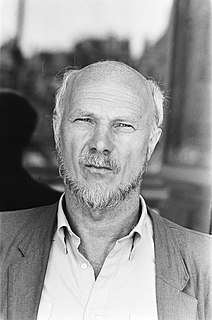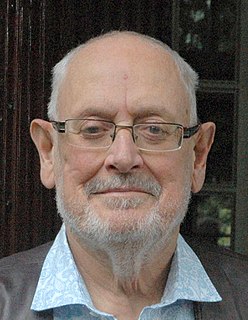Further reading
- Anon. 1959. "Wind Quintets: Common Antiseptic Quality". The Times (London) (Wednesday 25 March): 13.
- Zomeren, Koos van. 2005. "Geváárlijke symfonieën" (interview with Piet Honingh). NRC Handelsblad (Wednesday 16 November).
The Danzi Quintet was a Dutch wind quintet, one of the most highly regarded quintets active in the 1960s and 1970s
The quintet took its name from the 18th/19th-century composer Franz Danzi (a notable early composer of wind quintets), and was founded in 1956 or 1957 by the flutist Frans Vester. It was composed of members of the Concertgebouw and Dutch Opera Orchestras, and was initially formed in order to perform the Dutch premiere of Arnold Schoenberg's Wind Quintet, op. 26, which they did—after 107 rehearsals over the course of a year—at the 1958 Holland Festival. [1] The other founding members of the quintet were Leo Driehuys (oboe), Pem Godri (clarinet), Brian Pollard (bassoon), and Adriaan van Woudenberg (horn). [2] Vester played in the quintet for the entire period of its existence and was also its artistic director. Koen van Slogteren soon took over the position of oboist, and shortly afterward Piet Honingh became the clarinetist. Slogteren remained until 1971. [3] He was succeeded by Maarten Karres, then in 1973 by Han de Vries, [4] and later by Jan Spronk.
The Danzi Quintet acquired international fame, especially for their performances of contemporary music. [5] [2] [6] [7]
Many composers wrote works for the Danzi Quintet, amongst others Rob du Bois (Chants en contrepoints, 1962 and Réflexions sur le jour où Pérotin le Grand ressuscitera, 1969), Peter Schat (Improvisations and Symphonies, opus 11, 1960), Ton de Leeuw (Antiphony, for wind quintet and four-channel tape, 1960), Misha Mengelberg (Omtrent een componistenactie, 1966), Josef Tal (Wind Quintet, 1966), and Jan van Vlijmen (Second Wind Quintet, 1972).
Footnotes
Zilveren Nipkowschijf is a Dutch television award that has been given out since 1961 by a selection of Dutch critics.

Misha Mengelberg was a Dutch jazz pianist and composer. A prominent figure in post-WWII European Jazz, Mengelberg is known for his forays into free improvisation, for bringing humor into his music, and as a leading interpreter of songs by fellow pianists Thelonious Monk and Herbie Nichols.

A wind quintet, also known as a woodwind quintet, is a group of five wind players.

Oscar Ignatius Joannes van Dillen is a Dutch composer, conductor, and instrumentalist.

Lambertus Jacobus Johannes "Bertus" Aafjes was a Dutch poet noteworthy for his poems about resistance to German occupation during World War II.

Johan Theodorus Loevendie is a Dutch composer and clarinet player.

Cees Nooteboom is a Dutch novelist, poet and journalist. After the attention received by his novel Rituelen, which received the Pegasus Prize, it was the first of his novels to be translated into an English edition, published in 1983 by Louisiana State University Press of the United States. LSU Press published his first two novels in English in the following years, as well as other works through 1990. Harcourt and Grove Press have since published some of his works in English.
Diderik Wagenaar is a Dutch composer and musical theorist.

Rudi van Dantzig was a Dutch choreographer, company director, and writer. He was a pivotal figure in the rise to world renown of Dutch ballet in the latter half of the twentieth century.

Joey Roukens is a Dutch composer of contemporary classical music.

Hans Arthur Gerard van Manen is a Dutch ballet dancer, choreographer and photographer.
The Matthijs Vermeulen Award is the most important Dutch composition prize. It was named after the Dutch composer Matthijs Vermeulen (1888–1967).
Han Samuel de Vries, is a Dutch oboist and is considered the doyen of the Dutch school of oboe playing.
Frans Geysen is a Belgian composer and a writer on music topics.

Lucien Goethals was a Belgian composer.

Rob du Bois was a Dutch composer, pianist, and jurist.

Rudolf Escher was a Dutch composer and music theorist. He left compositions for chamber orchestra and orchestra, vocal and one electronic composition. Escher was also a poet, painter and writer.
Wim Franken was a Dutch composer, pianist and carillonneur.
The Jan Campert Prize is a Dutch literary prize established in 1948, which is awarded annually for works of poetry by the Jan Campert Foundation. The foundation was created in 1948 to honour Jan Campert, considered by many to be an icon of the Dutch resistance.

Alfred Momotenko-Levitsky, also known as Fred Momotenko, is a Dutch composer.